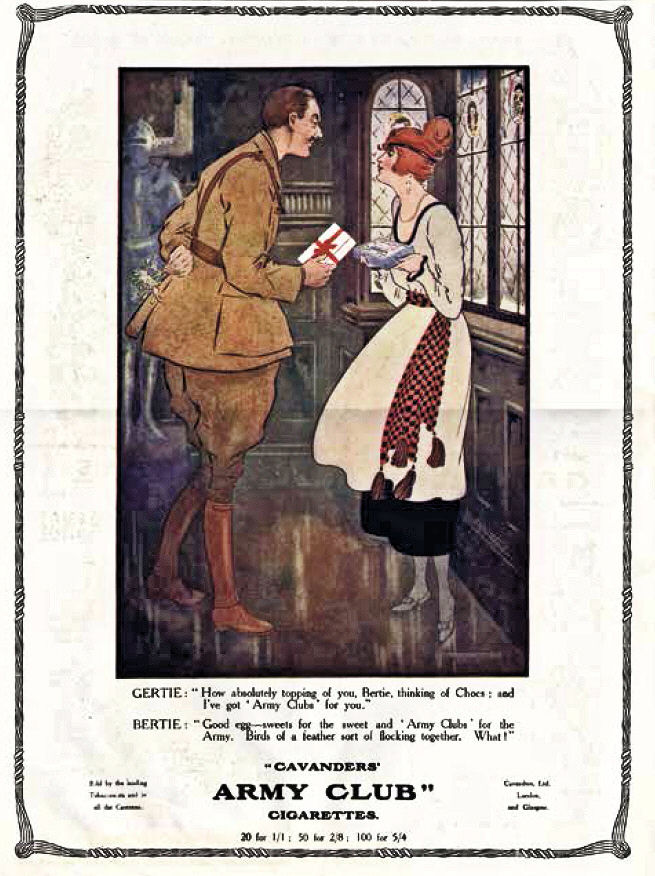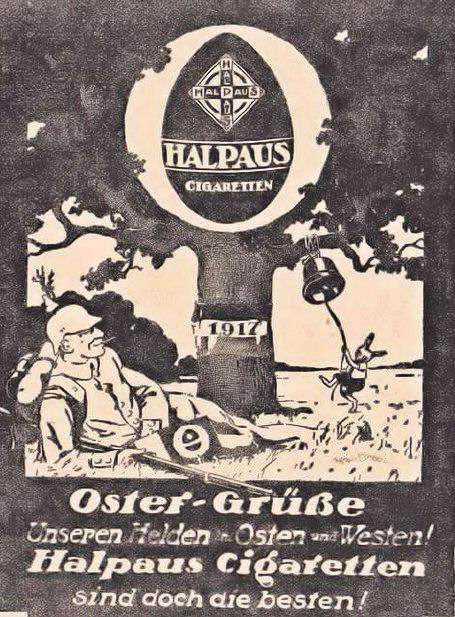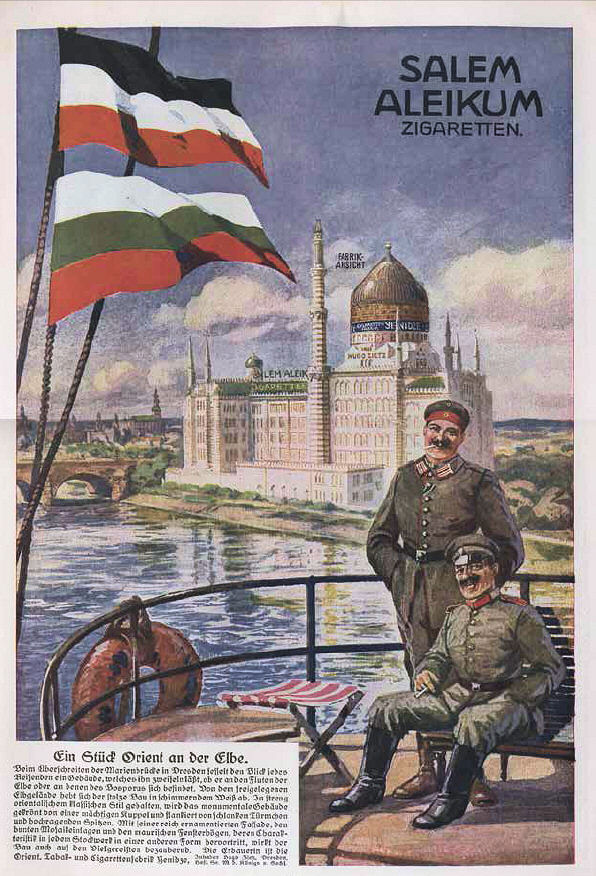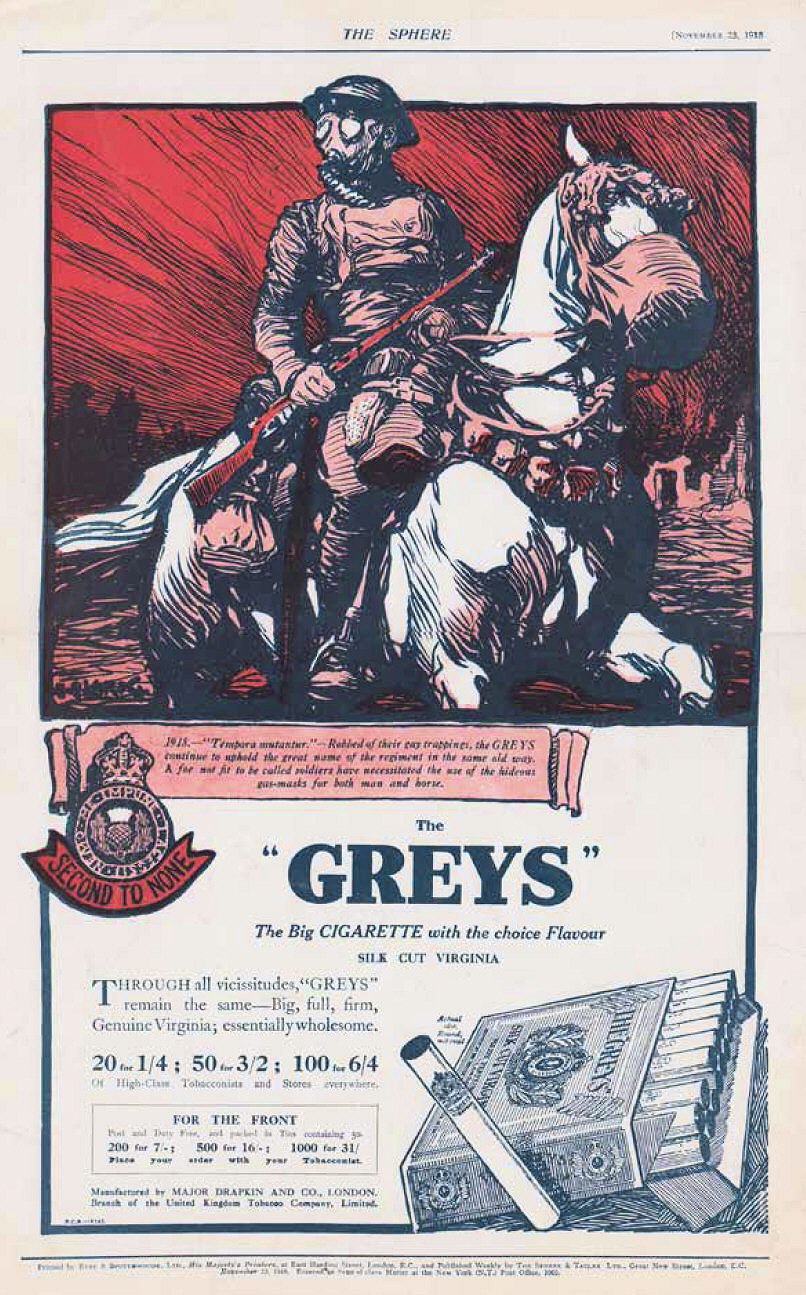Contributed by Tony Langley
If ever there was proof that war is a filthy business, then the Great War proved it by virtually creating the vast modern market for cigarettes. Prior to the Great War cigarette smoking – as opposed to manly cigars and the traditional pipe – was considered, somewhat contradictorally, to be a bit on the effeminate side for real men and generally too inappropriate an activity for ladies..
Click on Image to Expand
In the USA, cigarettes were not looked upon with much sympathy by various state legislators, in some cases there were even outright bans. But the war changed all of this almost overnight. Cigarettes proved to be just the thing to keep soldiers occupied during the long stretches of relative quiet and boredom at the front. They created a sense of camaraderie when shared out among mates, and by an odd quirk of reasoning, they were also thought to help keep the men away from hard liquor and loose ladies. General Pershing was quoted as saying that for the troops cigarettes were more important than bullets. Even associations like the YMCA and the Red Cross, which prior to war had been opposed in principle to smoking, ended up collecting vast quantities of cigarettes for the boys "Over There."
Click on Image to Expand
Naturally, all nationalities provided smokes for their troops, daily rations of tobacco being generous in most cases. While U.S. and British producers were the leaders in cigarette production, German firms often stressed the Turkish element in tobacco, as a sort of aside to their war-time ally. One German brand was called "Salem Aleikum," a proper Oriental form of greeting ("Peace Be Unto You"), which, all things considered, was somewhat ironic during wartime. But when was the advertising industry anything other than naively single-minded and apt to ignore the realities of the real world?
.
Click on Image to Expand
Most tobacco firms needed little advertising to keep sales at record highs during the war. Bull Durham in the U.S., for instance, sold the whole of its cigarette production to the War Department in 1918. Families were encouraged to send extra smokes to the troops, and here homefront advertising came into play. Soldiers rarely needed any advertising, but civilians could be enticed by the appropriate style of cigarette ads to choose a brand that fit their view of relatives in the service. Officers were thought to prefer a different brand than "other ranks" and this was reflected in British tobacco advertising.
Click on Image to Expand
After the war, the habit of cigarette smoking among all layers of society persisted, quietly but relentlessly, taking a toll of premature death among the men who learned to smoke in the trenches. The smoking habit would be further reinforced by the experiences of yet another world war a generation later.
Click on Image to Expand
(This one is my favorite, Tony. Apparently some advertisers had not discovered irony yet. MH)
Click on Image to Expand
A late addition from regular Roads contributor Stephen Harris, showing American National Guard Officers deployed along the U.S.-Mexican border in 1916.







It was actually the returning soldiers from the Crimean War (1854-1856) who first popularized smoking in the UK.
ReplyDeleteMany of the British cigarette manufacturers and the American companies under the monopolistic ownership of Duke were already well established by the time of the Anglo-Boer War (1899-1902).
In the first couple of years of the 20th century there was a "Tobacco War" between the American companies (Duke primarily) & the British companies to gain ownership of various companies in the US, the UK & elsewhere in the world. this led to the conglomerates of the American Tobacco Co., the British American Company and the International Tobacco Co., apart from the local tobacco firms.
If you mean cigarette smoking you are correct. Pipe smoking had been the most common form of tobacco use, especially among the working class, for centuries already by that point. Upper classes smoked Havana cigars or took snuff. Cigarettes democratized tobacco use. Of course there were exotic Oriental and “Egyptian,” cigarettes for the upper classes. These had largely disappeared by the end of WW2
Delete"If the Camels don't get you, the Fatimas will."
ReplyDeleteWoops! "...the Fatimas *must*."
ReplyDelete"I'd walk a mile for a Camel." . . .
ReplyDelete. . . "But not even a couple of yards for a Kent."
ReplyDeleteTruer words ne'er spoken!
DeleteInteresting. Nowadays we have different situation. It is very easy for soldiers to buy duty free Camel online
ReplyDeleteTruly, this article is really one of the very best in the history of articles. I am a antique ’Article’ collector and I sometimes read some new articles if I find them interesting. And I found this one pretty fascinating and it should go into my collection. Very good work! Tobacco
ReplyDeleteThe printing on the Sleeve Cigarettes Boxes can entice the curiosity of the customers and they will surely change their mind to try your brand for the first time. There are various benefits of manufacturing your own Sleeve Cigarette Boxes at home and this is the reason why you should take the advantage of this opportunity.
ReplyDeleteCustom Sleeve Cigarettes Boxes